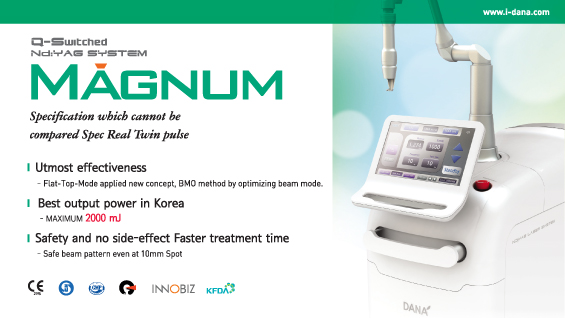Byung Gun Kim, Medical Director of BK Plastic Surgery Hospital “The future of Korea’s plastic surgery is in the foreign markets.”

“I didn’t spend any of the last 50 Sundays in Korea.”
Dr. Byung Gun Kim of BK Plastic Surgery Hospital holds medical license in many countries including the US, China, Singapore, Indonesia and Malaysia, etc. He did not just sit inside his office in Seoul to obtain these licenses but divided his time between different countries around the world.
[Advertisement] MAGNUM(Q-switched Nd:YAG Laser) – Manufacturer: (www.i-dana.com)]
Dr. Kim’s active career both inside and outside Korea is the reason behind the popularity of BK Plastic Surgery Hospital in foreign countries.
“I do manage a large hospital but my primary role is a surgeon and not manager. I spend as much time as I can on patient consultation and surgery. I am not a businessman and spend barely 10 minutes a day on business decisions. But when it comes to overseas businesses, I am a bit more aggressive. When no doctor from Korea ventured to do so, I opened a hospital in China and closed it in complete failure and had to find my way out of a shady deal. These painful experiences taught me a lot. I spent a lot of time in China last year.”
Despite his past tribulations, Dr. Kim’s outlook on China’s aesthetic medicine market is optimistic.
“We’ll have more Chinese patients in the near future because it is becoming easier for Chinese tourists to visit Korea. The Chinese do not mind traveling long distances. China and Korea are becoming closer not just in political relations but physically as well. Chinese visitors will come to Korea as if visiting a nearby city in China. The cost of an eyelid surgery in China is KRW 2-3 million which is even higher than the most expensive eyelid surgery in Korea. Chinese patients are seeking Korean doctors not just for better outcome but for price competitiveness. As long as the income levels are rising in China and Korean doctors offer good prices, the future of Korean plastic surgery is bright.”
Globalization of the medical market will make Korean doctors more competitive
If the future of the plastic surgery is bright, can the Korean doctors just sit and passively wait for the future? Dr. Kim emphasizes the importance of globalizing the Korean medical market.
“We only need to compete among ourselves in Korea. American doctors with a Harvard degree will not open practice in Korea so we don’t have to compete with them. On the other hand, doctors in other countries often have to compete with doctors around the world. In China, except for Beijing, Korean doctors can take a simple test to get licensed or can even practice without a license. But Chinese doctors cannot practice in Korea. This kind of inequality will not continue for long because China has been quickly advancing its market since it opened its doors to the world. Korea also needs to open its medical market and become stronger through global competition. The world is becoming smaller and all walls are coming down.”
Dr. Kim has his eyes on markets outside China as well.
“The Southeast Asian markets are quite different from China. As they are farther away from Korea, it is more difficult for patients to visit Korea. As many countries in this area are opening their medical markets to other countries, there is big potential for growth. I am also interested in the Middle East. The United Arab Emirates has a very open medical market. Foreign doctors can open their practice in a medical complex and do not have to pay taxes. For these reasons, world-renowned hospitals including hospitals affiliated with Harvard Medical School and Johns Hopkins University Medical School, etc. It is not easy to compete with such leading hospitals but I believe Korean doctors will one day have to enter the world market. The UAE has completely globalized its medical market and has created an environment where local doctors can compete against world-class medical professionals. Thus, the global market is open and I believe the future of Korea’s plastic surgery lies there.”
BK Plastic Surgery Hospital has opened doors to foreign doctors. It provides a training systems that welcome doctors around the world.
“Each year, my hospital welcomes hundreds of doctors around the world. We charge training fees to doctors that train for a day or a month. But we provide free training for doctors that stay for a year and even offer salary to those staying over 2 years. Foreign doctors that decide to stay in Korea for long-term training cannot treat Korean patients and instead have to do chores around the hospital to learn over the shoulders of the Korean doctors. Chinese doctors that train here go back to China and gain respect as they are deemed to have learned leading medical technology from Korea.”
More doctors mean more opportunities to learn.
Dr. Kim’s BK Plastic Surgery Hospital started small and now is a leading multi-specialty plastic surgery center of Korea. Dr. Kim started his private practice on the first floor of the current 15-story building that now exclusively houses the hospital. What was the secret that took him from the first floor to the entire 15-story building?
“The secret is rather simple. During the first year of opening, I was too busy to even brush my teeth. While brushing my teeth, I always had to juggle other things like reading the chart, etc. because there were just too many patients. It took me 4-5 years to expand to the third floor. And we needed more room so expanded upto the fifth floor. We still needed more room so we bought the building and tore it down to build a new 15-story building. We only expanded when we needed to accommodate more patients and did not use bank loans. Expansion was funded only by surplus profit.”
Dr. Kim explains that enlargement of his hospital was solely due to a large number of patients. Here, we had to ask what caused the sudden increase in patients because that is the real reason behind the impressive growth of his hospital.
Dr. Kim explains that the key advantage of a large hospital is safety.
“A large hospital offers better safety with extensive facilities that are not available at private practice. For example, a 3-dimensional CT (Computed Tomography) scanner costs hundreds of thousands of dollars. A resuscitation machine is also very costly. As this machine is only used in patients with cardiac arrest, it is generally not available in small practitioner’s office. In fact, we have very rarely used it at our hospital. Another factor that improves safety even more than expensive equipment is the team of 20 surgeons performing the surgery together. This is safer than a surgery done by a single doctor and the doctors can learn from each other and solve problems more efficiently. I also learn a lot from the doctors at my hospital. This helps us consistently provide safe and superior outcomes. Public health specialists who come to my hospital as trainees, if they are diligent, are able to master surgical skills that took me 10 years to learn. Another benefit of a large hospital is the cost-efficiency. The labor cost and rent are relatively low compared to a single doctor office. Also, you can pool your resources together as doctors can share supporting staff members and office space. Medical supplies are purchased at lower prices in bulk. The difficulty in managing a large hospital always comes from people. As many people with diverse personalities work together, problems may arise. They are rare but when they do arise, it is not easy to resolve them.”
Lastly, we asked Dr. Kim if he still had a goal that he would like to accomplish.
“I dreamed of establishing the best plastic surgery hospital in Korea and believe that I have achieved this dream. I do not want further expansion from here. I have no plans to go from our 15-story hospital to 30-story hospital. What I wish to do is to spread the superiority of Korean plastic surgery around the world. For example, Singapore is a medical hub for the global market. I would like to open a successful plastic surgery hospital there.”
Dr. Kim emphasizes, “Future doctors should not be too comfortable in the domestic market but compete with the best of the world in the global market.”

Dr. Kim spends a lot of his time in consultation and surgery. He only spends about ten minutes a day on management.

Dr. Kim appearing on Bucket List, a Chinese TV program scheduled to air soon. It features physical make-overs.
-The end-
by Yoo Inhong, D&PS Magazine




















